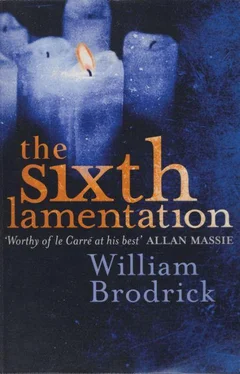William Brodrick - The Sixth Lamentation
Здесь есть возможность читать онлайн «William Brodrick - The Sixth Lamentation» весь текст электронной книги совершенно бесплатно (целиком полную версию без сокращений). В некоторых случаях можно слушать аудио, скачать через торрент в формате fb2 и присутствует краткое содержание. Жанр: Триллер, на английском языке. Описание произведения, (предисловие) а так же отзывы посетителей доступны на портале библиотеки ЛибКат.
- Название:The Sixth Lamentation
- Автор:
- Жанр:
- Год:неизвестен
- ISBN:нет данных
- Рейтинг книги:5 / 5. Голосов: 1
-
Избранное:Добавить в избранное
- Отзывы:
-
Ваша оценка:
- 100
- 1
- 2
- 3
- 4
- 5
The Sixth Lamentation: краткое содержание, описание и аннотация
Предлагаем к чтению аннотацию, описание, краткое содержание или предисловие (зависит от того, что написал сам автор книги «The Sixth Lamentation»). Если вы не нашли необходимую информацию о книге — напишите в комментариях, мы постараемся отыскать её.
The Sixth Lamentation — читать онлайн бесплатно полную книгу (весь текст) целиком
Ниже представлен текст книги, разбитый по страницам. Система сохранения места последней прочитанной страницы, позволяет с удобством читать онлайн бесплатно книгу «The Sixth Lamentation», без необходимости каждый раз заново искать на чём Вы остановились. Поставьте закладку, и сможете в любой момент перейти на страницу, на которой закончили чтение.
Интервал:
Закладка:
‘Pig,’ said Milby
An officer bending over an armchair recovered a set of keys, holding them up like a fish at the market.
‘Ah, they’re mine actually’ said Anselm.
The Detective Superintendent scrutinised his old adversary but let the puzzle pass. He said, ‘Any chance of a favour?’
‘Depends.’
‘The girl wants someone to explain to her grandmother what’s happened. Bit unwell apparently. More your scene than mine.
‘What’s going to happen to her?’ asked Anselm flatly gesturing towards Lucy
‘Firearms. You know the game.’
‘Favours sometimes have a price.
‘You should have been in the Drug Squad.’
Anselm urged the arresting officer to contact DI Armstrong, to ask if she would visit Lucy at the station. And then he accepted the offer of a lift to Chiswick Mall in a Detective Superintendent’s carriage.
Anselm spoke assurances to Agnes.’ trying to assuage her trapped anxiety. He pulled his chair closer to the bed so as to read the alphabet card, but then the housekeeper entered pushing a television on a small serving trolley.
‘Vicar, now is not the time to speak of The Last Things,’ she admonished. ‘You may preach, but after the news.
2
Lucy sat on a bench opposite the Custody Sergeant’s desk, waiting to be processed. Beside her sat Father Conroy summoned at Father Anselm’s request.
‘At least you didn’t pull the trigger,’ said the priest.
‘Would it have made any difference?’
‘I was never that good at moral theology. But I do know about people who send other people to prison, and they think there is a difference. ‘
The declaration carried a weight. With the peculiar acuity that comes with anxiety, Lucy asked, ‘Have you been to prison?’
‘Yes.’ He scratched the hairs on his thick arms. ‘Several times.’
A liberating curiosity surfaced over the panic. ‘What for?’
‘Working with street kids in Sao Paulo.’
‘You got locked up for that?’
‘It’s a touch more involved, so, but you can’t make a home for those little divils without upsetting people.’
The arresting officer summoned Lucy with a flick of his finger. Her pockets were emptied and she signed forms that she didn’t read.
‘Now, get your dainty skates on,’ said the Custody Sergeant. A waiting WPC took Lucy firmly by the elbow and escorted her down a colourless corridor to a cell. The heavy blue door slammed into position. Keys turned and jangled. The square peephole opened and banged shut. And, to the echo of withdrawing footsteps, Lucy started to cry.
The lock rattled as iron turned on iron. The door opened and DI Armstrong entered the cell. She sat on a chair fixed to the wall and said: ‘You have been extraordinarily stupid.’
Lucy lifted her hands helplessly as if she didn’t understand what she had done. She continued to cry, increasingly terrified by the working out of the legal process upon her.
DI Armstrong said, ‘I’ll do what I can to smooth things for you but my hands are tied. You are in serious trouble.’
Lucy nodded, grateful for the promise of a friend, however useless, within the system that would judge her.
‘There’s been a development in the Schwermann trial,’ DI Armstrong said, letting compassion slip out — evidently divining Lucy’s undisclosed interest in the verdict. ‘I don’t know what has happened but I expect it will be on the news. You can watch it with me. That is something I can do for you.’
3
After the fanfare of headlines and solemn bells, the picture shifted to live coverage of the lead story at the Old Bailey
Lighting stands and trails of wiring flanked the court entrance. Banks of cameras and boom microphones like slender cranes arched over metal railings on either side. Police officers in fluorescent yellow safety jackets stood at prescribed intervals around a pool of harsh, consuming light. High above the doors was the inscription read by Anselm at the outset of the trial: ‘Defend the children of the poor and punish the wrongdoer.’
A home affairs correspondent explained that after his sensational acquittal Schwermann had been escorted back to the cells, where a discreet exit had been planned. However, as he was about to depart an unidentified male had presented himself to court staff, seeking an urgent interview on what was understood to be a private matter. Upon hearing the name of the man concerned, Schwermann had consented to a meeting.
‘One thing we do know is that the consultation is over,’ said the reporter. ‘We’re expecting them to emerge through these doors behind me at any moment. We understand this individual may well be a survivor who… in fact, there’s some movement…’
The reporter shifted to one side as the court entrance jolted and opened, casting black, cutting shadows across the walls. A small man stepped out, shielding his eyes.
Lucy recognised the gentleman who’d sat beside her in the public gallery day after day giving her encouragement when it had no rational foundation; the man who had become a friend, Mr Salomon Lachaise. He moved to one side as Schwermann made his way forward. Microphones on angled poles followed him, clawing through the air at his neck and back.
Schwermann stood on the pavement, transfixed by the light, one hand nervously feeling the lower hem of his jacket. The camera position shifted closer, revealing Max Nightingale behind a policeman, his fists pushed deep into the pockets of his jacket.
Questions shot out from all sides, making it impossible to hear what was being said except for the constant repetition of Schwermann’s name. Salomon Lachaise looked on from a step — to Anselm’s eyes as if from a judgment seat; to Lucy all of a sudden a man in mourning. When Schwermann looked up from the floor to the cameras the questions abruptly ended.
Salomon Lachaise stepped back into shadow as Schwermann spoke:
‘This court has released me and declared me innocent. Before the eyes of the whole world I committed no crime.’ He started to laugh, his face contracted with pain as if gripped by a spreading cramp. ‘I started the war as one person, came to Paris… and overnight I became someone else… but I carried on doing what I’d done before.’ Small explosions of flashlight struck his face as though he were standing by a crackling, angry fire. ‘I admit I didn’t cry “stop”… but I did do something worthwhile… and it gave me a reason to live… a reason to escape… a reason to fight this trial. All I want to say is this…’
Max Nightingale shifted his stance from behind the policeman to get a clearer view of his grandfather.
‘Victor Brionne told the truth… but even he didn’t know what he was saying…’ Schwermann fell into a menacing, private fascination. The fine, smooth clattering of the cameras grew faster and louder; sheets of instantaneous flame danced and died, one after the other. Quietly, remonstrating with the light, he said, ‘A boy was saved.’
His right hand shakily fingered his jacket hem. Eyes wide, like a painted toy he said, ‘Hasn’t that made a difference?’
Eduard Walter Schwermann suddenly fell to his knees. The face of Salomon Lachaise moved into the light. A policeman lunged a step and halted, confused, as Schwermann, lifting the lower flap of his jacket, pulled at the inside lining. He fished something out and put it in his mouth, closed his eyes, bit and dropped like a marionette whose strings had been severed with a single cut.
As the commotion unfurled, the discerning viewer could easily see the diminutive figure of Salomon Lachaise in the background, walking heavily away from the pandemonium, into the shadows and out of sight.
Читать дальшеИнтервал:
Закладка:
Похожие книги на «The Sixth Lamentation»
Представляем Вашему вниманию похожие книги на «The Sixth Lamentation» списком для выбора. Мы отобрали схожую по названию и смыслу литературу в надежде предоставить читателям больше вариантов отыскать новые, интересные, ещё непрочитанные произведения.
Обсуждение, отзывы о книге «The Sixth Lamentation» и просто собственные мнения читателей. Оставьте ваши комментарии, напишите, что Вы думаете о произведении, его смысле или главных героях. Укажите что конкретно понравилось, а что нет, и почему Вы так считаете.












